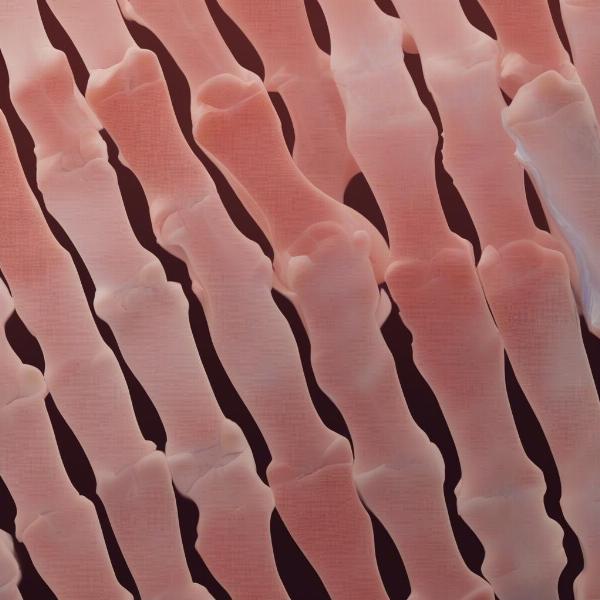Salmon is a popular, healthy fish for humans, rich in omega-3 fatty acids and protein. Naturally, many dog owners wonder if these benefits extend to their canine companions and if they can share their salmon, bones and all. However, the answer to whether dogs can have salmon bones is a resounding no. While cooked salmon flesh is generally safe and even beneficial for dogs in moderation, salmon bones, whether cooked or raw, pose a significant choking and internal injury risk.
The Dangers of Salmon Bones for Dogs
 Salmon bones can be dangerous for dogs.
Salmon bones can be dangerous for dogs.
Giving your dog salmon bones, even small ones, can lead to a variety of health problems. Cooked salmon bones become brittle and easily splinter, creating sharp shards that can get lodged in your dog’s throat, esophagus, stomach, or intestines. These splinters can cause painful punctures, tears, and blockages, potentially leading to serious infections or even life-threatening complications.
Raw salmon bones, while slightly less brittle than cooked ones, are still a choking hazard and can carry harmful bacteria like Salmonella and Listeria, which can cause food poisoning in both dogs and humans. frozen chicken feet for dogs are a safer alternative if you’re looking for a chewy treat.
Signs Your Dog May Have Swallowed a Salmon Bone
If your dog exhibits any of the following symptoms after consuming salmon, it’s crucial to contact your veterinarian immediately:
- Gagging or retching
- Excessive drooling
- Difficulty swallowing
- Vomiting
- Loss of appetite
- Abdominal pain
- Lethargy
“Early intervention is key when dealing with potential bone ingestion,” says Dr. Emily Carter, DVM, a veterinary specialist in canine nutrition. “The sooner you seek veterinary attention, the better the chances of a successful outcome.”
Safe Ways to Feed Salmon to Your Dog
While salmon bones are off-limits, cooked, boneless salmon can be a healthy addition to your dog’s diet in moderation. Salmon is packed with omega-3 fatty acids, which support healthy skin, coat, and joints. It’s also a good source of protein and other essential nutrients.
Always ensure the salmon is fully cooked and has been thoroughly deboned before offering it to your dog. Small amounts of skinless, boneless salmon can be mixed with their regular food or given as an occasional treat. Remember, even with boneless salmon, moderation is key. Too much salmon can lead to digestive upset or contribute to pancreatitis in some dogs.
Consider consulting your veterinarian about incorporating salmon into your dog’s diet. They can advise on the appropriate portion size based on your dog’s breed, size, age, and overall health. the dogs butcher can also be a great resource for high-quality, safe dog food options including salmon-based meals.
Alternatives to Salmon Bones for Dogs
If your dog enjoys chewing, there are many safe and healthy alternatives to salmon bones. Look for durable chew toys made specifically for dogs, such as those made from nylon or natural rubber. is canidae a good dog food and freezer dog food offer a variety of treats suitable for chewing. These toys can satisfy your dog’s natural chewing instinct without the risk of choking or internal injuries.
“Providing appropriate chew toys is essential for a dog’s dental health and mental well-being,” adds Dr. Carter. “Chewing helps to clean their teeth and reduce boredom, preventing destructive behaviors.” stobart raw dog food also provides a safe, raw alternative for dogs who love to chew.
Conclusion
While salmon itself can be a healthy treat for dogs, salmon bones pose significant dangers. Avoid giving your dog salmon bones, whether cooked or raw, to prevent choking hazards and potential internal injuries. Opt for cooked, boneless salmon in moderation and offer safe chew toys to satisfy your dog’s chewing instincts. By making informed choices, you can ensure your canine companion enjoys a healthy and happy life.
FAQ
- Can puppies have salmon? Yes, puppies can have small amounts of cooked, boneless salmon.
- What should I do if my dog eats a cooked salmon bone? Contact your veterinarian immediately.
- Are all fish bones bad for dogs? Yes, most fish bones are too small and brittle for dogs to consume safely.
- Can I give my dog canned salmon? Yes, but choose canned salmon packed in water, not oil, and ensure it’s boneless and skinless.
- What are some signs of salmonella poisoning in dogs? Vomiting, diarrhea, lethargy, fever, and loss of appetite.
- Are there any benefits to feeding my dog salmon? Yes, salmon is rich in omega-3 fatty acids, which are good for their skin, coat, and joints.
- How much salmon can I give my dog? Consult your veterinarian for the appropriate portion size for your dog.
About ILM Dog
ILM Dog is your trusted international resource for expert dog care advice. We offer practical guidance on a wide range of topics, from breed selection and puppy care to senior dog health, nutrition, training, and product recommendations. Our team is dedicated to providing dog owners worldwide with the information they need to nurture happy, healthy companions. For personalized advice or any questions, contact us at [email protected] or call us at +44 20-3965-8624.